
by Steve | Jan 12, 2018 | January-February 2018, Magazine, Magazine Articles
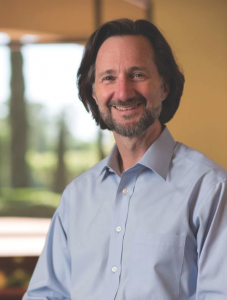
Renfroe
By Rob Renfroe-
Imagine that there was a package under your Christmas tree with your name on it. The paper was bright and colorful. The bow was beautiful with just enough glitter that it sparkled in the glow of the lights on the tree. With packaging like that, you could hardly wait to see what gift your parents had picked out for you.
Imagine the package was the same catcher’s mitt your parents gave you last Christmas. It didn’t fit and you had chosen not to use it. In fact, it was the same mitt your parents gave you four years before. Imagine how disappointed you would be.
Imagine that, and you are imagining “the gift” that a new group called “Uniting Methodists” has given the church. It is represented in one of the three proposals given to the Council of Bishops by the Commission on a Way Forward (page 18). Go to their website and you’ll see that the packaging is beautiful. There’s a new name, a new look, and some new faces. What’s not new is the solution the Uniting caucus is offering to resolve the problems that divide us. In fact, it’s the same solution the “centrists” brought to the 2016 General Conference and four years before that: change the Book of Discipline so that pastors could choose to marry gay couples or not and annual conferences could ordain practicing gay persons or not. This is the same solution that was rejected by the majority of delegates in 2016 and 2012. Now, repackaged and glowing, it’s under our tree again, presented as the latest and greatest idea for saving the unity of the church.
What’s also the same are some of the unconvincing arguments that have been used previously to promote “the local option.” For example, many pastors, some of very large “centrist” congregations, have said to me, “Our lay people disagree on whether we should ordain and marry gay persons, but they get along and remain in the same congregation, loving each other and doing the work of Christ. Why can’t the denomination do the same?”
My response is always the same, “So are some of the pastors on your staff marrying gay couples and some not? No? Then your congregation is not handling the issue the way you’re proposing for the denomination. What would happen in your congregation if you began to marry gay couples and other pastors on your staff refused to do so? Your people would pick sides and become divided. Maybe not all, but many. And a large number of your people would leave your congregation.” That’s exactly what would happen if the same old local option was approved by the denomination, regardless of the packaging.
What’s also the same is the certainty by some of our pastors that they can create a compromise without involving the two sides who are most dissatisfied with our current situation — the progressives and the traditionalists. The Reconciling Ministries Network and the United Methodist Queer Clergy Caucus have denounced the Uniting solution as unjust and doing harm to LGBTQ+ persons. It’s clear they cannot accept it. Both Good News and the newly-launched Wesleyan Covenant Association (WCA) have stated that they cannot live in a church that allows its bishops, pastors, and churches to promote what they believe to be unscriptural. But just like those previously pushing the local option, the leaders of Uniting Methodists felt no need to ask either group for input on a compromise that they (the progressives and the traditionalists) are expected to accept should it pass.
What’s not new is the disrespect that the “uniters” show for traditional believers in the Central Conferences and in the U.S. We have been exceedingly clear – many, if not most of us, cannot live in a church that allows its pastors, bishops, and annual conferences to promote what we believe is contrary to God’s Word. And that’s what the United Methodist Church will allow if the local option is adopted.
When Good News was asked to present our perspective to the Commission on a Way Forward, I pointed out that the “local option” did not receive enough support even to come to the floor of General Conference in 2016 in Portland. “It may be hard for progressives and centrists to understand, but many, if not most, traditionalists cannot participate in a church that allows its pastors and bishops to promote something they believe to be sinful even if they themselves are not required to do so,” I wrote.
With more than 1,800 in attendance at its first gathering in Chicago in 2016, the WCA passed a statement to the bishops which included the following: “A plan that requires traditionalists to compromise their principles and understanding of Scripture, including any form of the ‘local option’ around ordination and marriage, will not be acceptable to the members of the Wesleyan Covenant Association…”
How can you claim to be “uniting” when you ignore the traditionalist/evangelical movement within United Methodism that has said it cannot live with your solution? We’ve said, “The old catcher’s mitt doesn’t fit us and we won’t use it.” But instead of doing the hard – and respectful – work of trying to understand our values and creating a new solution, Uniting Methodists have offered the same old gift that we have told them doesn’t work for us.
What’s also not new is the lack of transparency exhibited by the “Uniting” effort. Its claim to be “clarifying” is off-putting, to put it politely. To be transparent, the “uniters” should be clear about their ultimate goal. Many who support Uniting Methodists, including those with the highest profiles, are working for this compromise to hold the church together until the consensus changes and all pastors are expected to marry gay persons and all annual conferences ordain practicing homosexuals. As one Uniting leader told me, “It’s just a matter of time. The culture is changing. Young people don’t even know why we’re having this discussion. They are the future, not older folks who favor the current position.” What Uniting Methodists is proposing is not a compromise that resolves our differences; it is a strategy to hold the church together until the church’s position changes altogether.
If there’s nothing new to see here, why the new push? Why repackage the same old ideas in hopes that many people will think they’ve been given a new gift? Perhaps they believe the Africans will change their minds about biblical standards and sexuality. Perhaps they believe evangelicals will deny their principles. Perhaps they believe LGBTQ+ advocates will accept a solution which they believe to be injustice. And what has been rejected before on several occasions will be embraced not as the same old catcher’s mitt, but as the lovely new gift we have always wanted. It’s hard to believe that leading centrists are that naïve.
A very different rationale is possible. The bishops’ commission, to resolve our problems, will have to present a plan that puts enough distance between progressives and traditionalists that both sides can support it. (One that has been discussed coming out of the Commission on a Way Forward involves creating three ideological/theological jurisdictions – progressive, centrist, and conservative – each with different positions regarding sexuality, marriage, and ordination.)
If the church is to divide into two or three different groups, each new entity will want to take as many churches, pastors, and people with it as possible. The “middle” group will want to reach as many center-right and center-left people as possible. How do you do that? You present yourself as Christ-centered, mission-minded, open-hearted, and willing to make room for everyone, which is exactly what the Uniting Methodist website does. (Honestly, its leaders whom I know personally are as they describe themselves. We simply disagree profoundly on the inspiration and the authority of the Bible.)
But “centrists” who lean left or right, will need to do some soul searching before they jump into a middle jurisdiction that adopts the local option. Those who are center-left will need to ask themselves how long they will put up with injustice. Will they be joining with Uniting Methodists in a pragmatic decision to step into the slow arc of history that is moving in the right direction? Or will they be joining a group of pastors who are willing to accept injustice for who knows how long because to promote change right now would disrupt and divide their churches?
Those who are center-right need to be clear that what the Uniting group is offering is no compromise. And it will not stop the fighting, at least not right away, not within the jurisdiction in the middle. Progressives who remain in the center will continue to push until those in the middle have adopted a thoroughly liberal sexual ethic. When the position changes, center-right pastors who chose “the middle way” will find themselves abandoned and far from home. If center-right pastors cannot accept a progressive sexual ethic in the future, the best time to decide not to remain with the centrists is now – not after they have joined the Uniting caucus because it seems safe and reasonable only to watch the inevitable drift to a progressive position they cannot abide.
Well, it’s very confusing. But one thing is clear: if you liked last year’s catcher’s mitt, you’re going to love the Uniting plan. But if you’re hoping for something new under the tree, you’ll need to look elsewhere.

by Steve | Jan 12, 2018 | January-February 2018, Magazine, Magazine Articles

Photo courtesy of charity: water.
Scott Harrison grew up as a “good Christian kid.” His family was happy, until they weren’t. When a carbon monoxide leak in their home destroyed his mother’s immune system, Scott began to take care of everything around the house. At the age of 18 he escaped into music and became a nightclub promoter in New York City. This launched him into a life he would later call morally, spiritually, and emotionally bankrupt. For nearly ten years he smoked two packs of cigarettes a day, got drunk every night, attended strip clubs, gambled, and took just about every drug except heroin.
One night, at a New Year’s Eve party in Punta del Este, Uruguay, the noise all became too much. “Although it looked glamorous on the outside, there was a long decline in my happiness,” he says. “I remember just feeling so unhealthy about it all. The next day the party was still going, but I just wanted the music to stop.”
Back in New York with a desire to find his way back to a very lost faith, Harrison sold nearly everything he owned and decided to commit a full year to serving others rather than himself. After countless organizations turned him down due to his past, one finally agreed to allow him to volunteer his services as a photojournalist on a trip to Liberia.

Photo courtesy of charity: water.
On this trip, Scott encountered individuals whose deformities left them outcasts and sometimes fighting for their lives. The surgeon on the ship, Gary Parker, worked to bring them new life and hope through the surgeries he provided. As he was documenting these stories, Scott learned that one of the major sources of the sickness for these people was unclean water. Jarred by this realization, he went back to New York with a plan.
Utilizing his skills as a former nightclub promoter, Scott threw a party for his 31st birthday. With a club donated for the cause and 700 people enticed to come for the open bar, he charged a cover fee of $20 and raised over $1500. They sent the money to a refugee camp in Uganda and followed up with the guests about what they were doing there. With the donations, they built three wells and fixed three more.

Photo courtesy of charity: water.
This was the beginning of charity: water. People all over the world began donating their birthdays to raise money for clean water. In order to make sure all donated funds go directly to building and repairing wells, Scott set up a second account for an overhead fund and found alternate donors to cover those costs. He also added GPS coordinates to the sites, provided pictures of the projects for Google maps, and put locals in charge.
Since its inception in 2006, charity: water has funded 24,000 projects and provided water to 7.3 million people.
-Courtney Lott is editorial assistant at Good News.

by Steve | Jan 12, 2018 | January-February 2018, Magazine, Magazine Articles
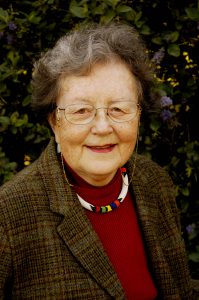 The Rev. Jeanne Audrey Powers died while traveling in Switzerland on September 29, 2017. She was 85. The obituary from the Minnesota Annual Conference was on target: “Always on the leading edge of historical shifts in culture, Rev. Powers was a global-level advocate for a more progressive, inclusive faith, focused on inclusive language, relevant liturgies, LGBTQ struggles, and opening leadership opportunities to women, young people, and people of many cultures.”
The Rev. Jeanne Audrey Powers died while traveling in Switzerland on September 29, 2017. She was 85. The obituary from the Minnesota Annual Conference was on target: “Always on the leading edge of historical shifts in culture, Rev. Powers was a global-level advocate for a more progressive, inclusive faith, focused on inclusive language, relevant liturgies, LGBTQ struggles, and opening leadership opportunities to women, young people, and people of many cultures.”
Let us mark her passing by expressing heartfelt respect for Powers – even though Good News was on the opposite side of key issues within United Methodism. Over the years she served in various capacities, most notably with the General Commission on Christian Unity and Interreligious Concerns, and the World and National Councils of Churches. Her obituary properly notes,“Until her death, she was a driving force in the Reconciling Ministries Movement and she came out as a lesbian during her sermon at its national gathering in 1995.” She was 63 years old at the time.
While she was widely praised throughout the UM Church for the courage of her decision, the Good News board of directors stated its belief that her public declaration was “openly defying the witness of the United Methodist Church” and “raising the challenge as to whether United Methodism can and will effectively enforce its own Discipline.”
Despite Good News’ opposition to her announcement, the Rev. Powers was a faithful paying Good News subscriber until her death. Last year, she called our offices to check on her subscription and kindly reminded us that she was on “the other side” but also said she loved our magazine because she felt we did a good job of explaining difficult issues. For the editorial team, this was a treasured comment.
Powers was an unapologetically liberal lioness, but she was also gracious, fair-minded, and intellectually curious. During her twilight years, we were able to let her know our appreciation of her consistent readership. In this day and age, we are gratified when progressives like Powers are willing to read publications outside their echo chamber. Conservative evangelicals are best served when they do the same.
Recently, we were startled and disappointed to read one of our leading United Methodist bishops publicly admitting “having given up Christian Century (too predictably liberal), Christianity Today (too Calvinist) and First Things (too predictably conservative) long ago” and only subscribing to a Quaker publication. We have no need to criticize this leader’s desire to winnow down his reading list. We trust that he is a vigorous thinker and lifelong learner. We would simply ask that the subscription decisions be reconsidered. Of course, this is an important issue to us. We gain a lot from journals of opinion – as would UM clergy and laity. Although we are an independently-supported magazine with a decidedly evangelical and traditionalist viewpoint, we put a premium value on fairness, charity, and reliable journalism. We welcome readers – the ones who agree and the loyal opposition.
“I have chosen to swim against the stream in many areas of controversy [in the church] because I truly believe that the Church is the Body of Christ, called to share its message of healing, reconciliation, and yes, salvation,” said Rev. Powers. “I do not choose the Church simply because I want to belong, but because I believe in its transforming Spirit.”
We did not agree upon many things, but we share a belief in her words above. Despite our differences, we will always be grateful for her graciousness and eager willingness to read broadly. Jeanne Audrey Powers, RIP.
– Good News.

by Steve | Jan 12, 2018 | January-February 2018, Magazine, Magazine Articles
 By Steve Beard
By Steve Beard
For three years, they were ultimately voyaging back home. Along the way, they circumnavigated the globe – without so much as a compass. The crew of the Hokule’a, a 62-foot-long Polynesian sailing canoe, traversed more than 40,000 nautical miles in its epic journey with no engine or modern navigational instruments. Having set sail in 2014, the crew returned to Hawaii in July 2017. Guided only by their assessment of the sun, moon, stars, wind, swells, and sea life patterns, the Polynesian Voyaging Society accomplished a global trek that most people thought was impossible.
In an era enamored by technological pinnacles, chalk this extraordinary triumph up to the ancient South Pacific ways.
In order to grab hold of the wow-factor behind this feat, forget about touristy ocean cruising. On the Hokule’a (ho-koo-lay-ah, “Star of Gladness” in Hawaiian), there was no midnight buffet, ice sculptures, or cocktails on the lido deck. There was no refrigeration, restroom stalls, or internet café on the catamaran-style vessel. The showers were buckets of seawater and the canvas-covered sleeping quarters were 6 foot segments marked out in the hulls where the 12-member crew slept head-to-foot. Spartan conditions. Spectacular adventure.
Participating in month-long shifts, there were more than 250 different volunteer sailors. “They strapped on safety harnesses to change sails and tighten lines; hauled heavy anchors out of the water; loaded bulky supplies; cooked hearty meals for a dozen people using a camping stove,” Marcel Honoré reported in the Honolulu Star Advertiser. (more…)
![Unleashed for Ministry]()
by Steve | Jan 12, 2018 | January-February 2018, Magazine

Jesus and the woman at the well by Ukrainian artist Oleksandr Antonyuk. Used by permission of the artist.
By Cara Nicklas-
I want to see revival in our church. I want to be part of a movement of God. And the church as an institution excites me only in so far as that institution is willing to submit itself to that larger movement of God.
Our church is at a crossroads. Some would even say we are in crisis. And there is plenty of blame to go around. We can blame the bishops, General Conference, and our pastors who have ignored the issues that have resulted in this defining moment for our church.
Speaking as a lay person, however, it is important for laity to share the blame as well. If we earnestly long for a vibrant renewal of the Wesleyan movement, we lay folks must seriously examine ourselves and our personal responsibilities in an honest and fair manner.
As a way of making that examination, I’d like to briefly reconsider why the Wesleyan expression of Christianity inspired so many of us in the first place.
We Methodists have a long rich history of leading people to Christ and then helping them grow as disciples who are passionate about sharing the Gospel with others, in both word and deed. Our roots are grounded in a Wesleyan theology that strikes the perfect balance between truth and grace, head and heart, personal piety and social holiness.
I love the richness that comes from our global denomination, one that is committed to the great teachings of the Christian faith that reach all the way back to the early church. The Apostles’ and Nicene Creeds remind me that I am joining with that great cloud of witnesses that preceded us, and with brothers and sisters around the world. The church’s historical and global context keeps me from making a mistake we are prone to make: interpreting Scripture and the great confessions of our faith solely within the context of our own culture. Our Wesleyan expression of the faith is truly global in its appeal.
In 2016, I was a delegate to General Conference in Portland, Oregon. Overall, it was a discouraging and frustrating experience. But there was a moment that profoundly moved me. The worldwide nature of our church was evident during the opening worship service when we sang the hymn “Holy, Holy, Holy” in various languages. I stood in the conference center surrounded by my brothers and sisters from Africa, the Philippines, Russia, and other parts of the world, as we sang this familiar hymn together. We sang each stanza in a different language. The last stanza was in English and the swell of voices unified in our praise to God moved me to tears. One African delegate later commented to me that it was an image of heaven. And it was. We don’t want to lose that connection – we want to restore it and build on it.
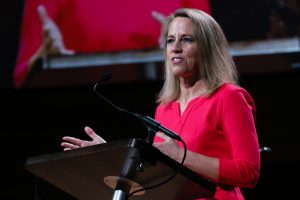
Cara Nicklas speaking at the Wesleyan Covenant Association gathering in Houston. Photo by Steve Beard.
But, juxtaposed with the encouragement I felt singing “Holy, Holy, Holy” was the realization that more often than not our church bears the marks of a stagnated, inward looking institution, rather than the marks of a passionate, outward looking movement. Our denomination has increasingly come to depend on professional clergy for the work of the church. We might talk about how we are partners in ministry – clergy and laity – but in practice, we laity are not equipped, empowered, or released to do ministry both within and outside the walls of the church. Sure, we might be asked to round up volunteers for the nursery or head up the local canned food drive. But too often, we lay folks have been content to leave evangelism and discipleship to our pastors. And I think we all know deep down that’s not how Jesus envisioned the Great Commission.
The mission statement for The United Methodist Church is: “Making Disciples of Jesus Christ for the Transformation of the World.” It’s an admirable and good mission statement. But within our denomination I think there is a philosophical difference about whether transforming the world leads to making disciples of Jesus Christ or whether making disciples of Jesus Christ leads to the transformation of this world.
Some United Methodists emphasize transforming the world first, so they choose to pour significant resources into lobbying efforts for social justice issues. They place a lower emphasis on literally sharing the Gospel story with others. They seem to believe that by demonstrating our passion for a wide array of social justice issues, people will come to know Christ, if not as their Savior, then at least as a historical figure worthy of their emulation. The church, they argue, will attract new adherents by being on the right side of this or that social, economic, or political issue.
I don’t believe the data supports that approach. And even if it did, I’m convinced it’s the wrong way forward.
Please do not misunderstand me; I am not trying to downplay the importance of our social witness. I just don’t believe we will ever be good and discerning advocates of social issues without the saving knowledge of Jesus Christ as our Lord and Savior. If we are to become, once again, the movement our founder intended us to be, then lay people must recapture our passion for telling others about Jesus.
Since the creation of The United Methodist Church in 1968, membership has declined every year in the U.S. And over the past 10 years, average worship attendance has fallen dramatically. So at General Conference I found it baffling that we never addressed two critical questions: Why are we not a growing church? And what must we do to become a growing church?
At General Conference, we spent an inordinate amount of time debating social and political issues: divestment from Israel, climate change, a single payer healthcare system, and so on. But little or no time was given to how we might more effectively share the Gospel with the lost and hurting in our societies who are in need of a saving relationship with our risen Lord. We spent more time attending to the institution’s needs and what the institution should say about this or that issue, rather than how the institution can become a growing movement committed to making disciples for Jesus Christ.
To my fellow lay persons, it is up to us to have that discussion even if our leadership fails to have it. It is time for us to initiate that discussion in our local church.
And if we are going to do that we have to ask ourselves some challenging questions:
• Am I becoming a spiritually mature Christian?
• Am I intentional about cultivating those disciplines that lead to a life that honors God?
• Am I regularly reading Scripture with others?
• Earnestly praying with others?
• Confessing my sins to close friends in the faith so they might challenge me and help me to grow?
• Am I joining with them to tell others about Jesus?
• Am I serving people who are lost and lonely and need to hear the Good News?
• In short, am I living the Wesleyan expression of the Christian faith?
I know many of us readily volunteer to fill various roles in the church. We sing in the choir, serve as ushers, chair a committee, or even lead a local mission project. Those roles are needed. But those are not substitutes for participation in small groups where we read and study God’s word together, where we are willing to humble ourselves for our own good, and where we challenge one another to grow deeper in our faith in Christ.
We need ushers, and we need someone to chair the finance committee, but more than anything, we need people fully invested in becoming mature Christians who know how to, and passionately want to, share the Gospel of Jesus Christ with others.
What I am describing here is in large part the genius of the Wesleyan expression of the Christian faith: the emphasis John Wesley gave to small, accountability groups. If we are to grow again as a church, we laity will have to rededicate ourselves to becoming mature Christians who are equipped to share the Good News. (See The Band Meeting: Rediscovering Relationship Discipleship in Transformational Community (Seedbed) by Professors Scott Kisker and Kevin Watson.)
That means we need more laity to claim ownership of a small group. Pastors cannot do everything in our churches. They, of course, have an important role to play in equipping lay leaders so they can effectively lead small groups with sound teaching and a good understanding of the Wesleyan approach to Scripture.
At the same time, laity must step up and ensure that our congregations have small groups where men and women read Scripture together and so are challenged and transformed by it.
I have been in plenty of small groups where leaders use curriculum that references Scripture in passing. Teachers show up with a short list of questions to toss out to the group for discussion without the group having studied or prepared in advance. I mean no offense, but too often this results in a group of nice people sitting around sharing their feelings. And this frequently includes misguided theology that goes unchallenged. Someone says something like, “I think as long as a person is sincere in what he or she believes about God, that’s good enough.” Or they say, “Everyone’s interpretation of Scripture is equally valid.” And the rest of us politely nod our heads in agreement.
There must be someone in every small group who gently pushes back on such statements. Spiritual maturity only occurs when we dig deeper into what Scripture and our timeless confessions of faith have to teach us about spiritual maturity.
I know what some of you are thinking. We know from Scripture that God gives each of us certain gifts. And you are thinking, I’m not really a teacher. I don’t have the spiritual gifts of evangelism or shepherding. We have a tendency to claim not to be gifted in an area that is hard – that stretches us – that is time consuming, or that we just don’t want to do.
Friends, God is forever asking us to do things outside our comfort zones. The Bible is filled with leaders who tried to tell God they could not do this or that, or that he’d be better off choosing someone else. God wasn’t interested in their excuses, and I doubt he’s interested in ours.
I have two sons, Connor, my older son, and Evan, my younger one. When they were growing up, we’d be at McDonald’s and I’d instruct Evan to go ask one of the employees for some ketchup. He’d immediately turn to Connor and beg him to go instead. The thought of actually talking to a stranger made him genuinely anxious. Connor didn’t know a stranger, so he’d happily oblige. And at church youth group meetings, Evan rarely if ever shared his thoughts or contributed to the discussion. He did not feel equipped or knowledgeable enough to speak up.
So, you can imagine my husband’s and my surprise when during his freshman year of college, Evan was asked to teach and lead the youth group for our church’s new satellite campus. Admittedly, my first thought was, “That’s not his gift? Why would our pastors ask Evan to teach when they must know how uncomfortable he is speaking to others?”
Evan could have replied, “Teaching and leading are not my gifts.” Or, as a busy biology major with a rigorous course load, he could have said, “I don’t have the time.” But to my surprise he said, “Yes.” Evan demonstrated a sense of spiritual maturity I admire, and over the last few years, I can see incredible growth in his life because he had the courage to say, “Yes.” True, it takes him twice as long as it would take his brother to prepare a lesson because he feels the need to over prepare. But he willingly does it because he wants these kids to know Jesus.
Are you doing something in the way of discipleship or evangelism that is outside your comfort zone? Maybe you really don’t have a gift of teaching or even talking in a group of people. You might ask yourself what you can do to help someone who has agreed to lead a small group. And you might figure out how you can help lead at least one person in your church who needs their heart strangely warmed or who needs nudged to grow deeper in the faith. If you are in a small group, do you study and prepare before you gather so that you are a contributor to the discussion? Bible study is meant to be done in community. If you aren’t leading, are you at least preparing so you can genuinely participate?
And pastors, I assure you Evan would not have emerged as a leader and used his gifts if a pastor had not reached out to him and made the ask. A pastor saw something in Evan that his parents and he himself didn’t see. Please don’t overlook the quiet person, the introvert in your church, who might be willing to step outside his or her comfort zone. Instead, help that lay person hear God’s call. Equip that person and give that person authority to be a minister of the Good News of Jesus in the world.
Recently I was reading the familiar story in the Gospel of John of the Samaritan woman at the well. You know the story. Jesus is in Samaria and stops at Jacob’s well in the heat of the day. The Samaritan woman comes to draw water. Jesus asks her for a drink; she is shocked. He’s a Jew; she’s a Samaritan. He’s a man, she’s a woman. Jesus reveals he knows her, warts and all. And yet he offers the woman living water and declares he is the Messiah. That’s the most familiar part of the story.
But I want to focus on the rest of the story, on that Samaritan woman. She leaves her water jar, goes back to town and tells the people, “Come, see a man who told me everything I ever did. Could this be the Christ?” And Scripture says, many of the Samaritans from that town believed in him because of the woman’s testimony.
Many Samaritans believed! Why? Because a woman who was an outcast in that town experienced the love of Christ in such a profound way that she couldn’t keep the news to herself.
• The Samaritan woman didn’t return to town and think to herself, “I must find the religious leader in my community and ask him to tell the people in town about the Messiah.”
• She didn’t return to town and think, “I must organize a food bank because if I make sure the poor are fed, then people will figure out by my example of generosity that this man Jesus is the Savior of the world.”
• The Samaritan woman didn’t think to herself after meeting Jesus that she wished she had the gift of evangelism or apostleship, because if she did, she’d be able tell others about Jesus.
No. The Samaritan woman, the outcast, the sinner, the woman who came to draw water from the well at high noon to avoid socializing with others – she told the whole town about Jesus!
Friends, I know the excuses for not telling others about Christ because I’ve used them myself. I don’t want to offend someone by imposing my beliefs on them. So, I’ll just be nice to them and hope they become a believer based on my kindness. We Methodists even boast about how we don’t try to impose our faith on others.
If I think someone might be open to coming to church or hearing about Jesus, I much prefer telling my pastor, “Hey, I know this person you should talk to who needs to know Jesus.”
Or, I will pour all my energy into a worthy ministry: the after school program at my church, helping build homes for the poor, or organizing others to buy Christmas gifts for needy children. These are wonderful things to do, but when I’m honest with myself, I have to admit I sometimes do them to justify not actually using words to tell others about Jesus. Ironically, my good deeds in Jesus’ name are actually my cover for not telling people about Jesus.
The Samaritan woman shows us these excuses don’t exempt us from proclaiming the Good News. If we have a deep relationship with Christ that causes us to marvel every day at how God’s grace is even sufficient for us, how can we not share our story with others?
My hope for the next Methodism does not lie with the Commission on a Way Forward, our Council of Bishops, or even our General Conference. My hope lies with my fellow lay persons. Or to put it more correctly, my hope is in Christ working through laity who long to become spiritually mature Christians, and so in turn feel a burning desire to tell others about the overwhelming joy of knowing Jesus as their Lord and Savior.
Cara Nicklas is an attorney in Oklahoma City, a General Conference delegate from the Oklahoma Annual Conference, and a council member of the Wesleyan Covenant Association. This essay is adapted from her October 2017 address to the Wesleyan Covenant Association gathering in Houston.

by Steve | Jan 12, 2018 | January-February 2018, Magazine, Magazine Articles
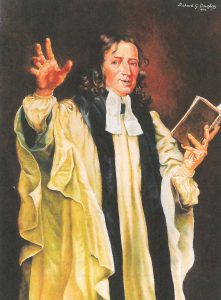
Dr. Richard Douglas painted this portrait of John Wesley in 2003. According to the late Dr. Kenneth Kinghorn, the portrait shows “Wesley preaching without notes, while holding his famous field Bible….He wears no wig, and his natural hair had a slight auburn tint” (John Wesley: An Album of Portraits and Engravings, Empethpress.com). This portrait hangs at Asbury Theological Seminary.
By Donald Haynes-
For the first time since the young United Methodist Church struggled with our theology in 1968 and again in 1988, we are once again asking, “What do the spiritual progeny of John Wesley believe?” Just as importantly, however, is the unusual linkage that Wesley (1703-1791) made between what we believe and how we live. Wesley’s disagreement with Lutheran and Calvinist theology was that while we are saved by our faith in God’s grace, we are saved to “faithfulness.” He called it “holiness of heart and life.”
In the coming months of 2018-2020, United Methodism must examine our roots of what we believe and how that belief affects our morals and ethics. Whether we are “progressive” or “traditional” in our theological bent, our present way forward must be done in the context of historic Wesleyanism. To use seminary terminology, what is our Wesleyan relationship between orthodoxy and orthopraxy? We must be true to who we are. So what is our “consensus of faith” rooted in the Methodist movement within the Church of England and, even more importantly, what is our evangelical heritage in American Methodism, United Brethren, and the Evangelical Association?
In the important but often overlooked book, John Wesley’s Experimental Divinity by Dr. Robert Cushman of Duke Divinity School, we see early Methodists finding common affirmation to the Latin term “consensus Fidelium” or “consensus of faith.” That is, “what do we children of Wesley hold in common; on what can we agree to be our theological heritage?” This will never mean that every United Methodist has the same conscience regarding what is right and what is wrong in the sight of God. Truly, we are called to Wesley’s insistence that we “love alike” even when we do not “think alike.” But that “catholic spirit” does not give us the freedom to “love God and do what we please.” That is called “antinomianism” (anti means “against” and nomos means “the law”). Antinomianism disengages doctrine from a disciplined life.
Holy living was a dimension of being a Christian that Wesley retained from his own journey that began in his college days at Oxford in 1725 and continued until the marvelous night of Aldersgate on May 24, 1738 when he “felt his heart strangely warmed.” While it was not until that night that he felt the inner peace that comes with knowing our sins forgiven, Wesley had practiced Christian discipline (“holy living”). He calls it “the habitual disposition of the soul which in the Sacred Writings is called ‘holiness,’ and which directly implies the being cleansed from sin, ‘from all filthiness both of flesh and spirit,’ … being so ‘renewed in the image of our mind’ as to be ‘perfect as our Father in heaven is perfect’” (Matthew 5:48).
As Dr. Randy Maddox of Duke Divinity School has so clearly outlined for us, Wesley’s grace theology was not totally the divinely initiated grace that the Calvinists believe in. Rather it was what Maddox calls in his book by the same title, “responsible grace.” That is, Wesley insisted that God first loves us as we see in John 3:16: “God so loved … that God gave … that we might have eternal life.” However, we are free to accept or reject God’s love and, if we accept God’s initiating love, we are required to practice a disciplined response, just as any responsible relationship does.
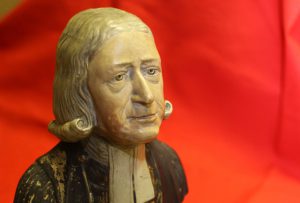
Bust of John Wesley from the famous English artisan Enoch Wood (1759-1840). A UMNS photo by Kathleen Barry.
John Calvin (1509-1564) believed that grace is irresistible; Wesley believed that we have the free will to resist or reject God’s love. Maddox calls this “synergism.” In accepting God’s grace, we must live “in sync” with Jesus. John the Elder wrote in his second epistle, “This is love: that we walk in obedience to his commands. As you have heard from the beginning, his command is that you walk in love” (II John vs. 6). In his third epistle, John wrote to Gaius, “I have no greater joy than to hear that my children are walking in the Truth” (vs. 4). All these and many more scriptural references document Wesley’s insistence that God’s initiating grace is to be met with our responsive faith; so it is that we are saved by God’s grace through our responsive faith.
The “consensus of faith” that Cushman delineated correctly identifies three “faces of grace.” First of all is God’s preparing grace that in older language was called “prevenient grace.” Prevenient grace is indeed at God’s initiative. Then, if we might be colloquial, “the ball comes to our court.” If we respond affirmatively, we reach what Wesley called the “porch of salvation” and we repent of our sins. But repentance is not remorse; it is an active work of the Holy Spirit witnessing with our spirit that our confessional repentance is met with what Jesus illustrated as the “waiting father” in the Parable of the Prodigal Son. We are changed. That is, God meets our response to his love with what Wesley experienced at Aldersgate — a strangely warmed heart. It is the second dimension of what Wesley called the “scriptural way of salvation.” The revival movement of the 19th century codified this as “being saved.” Paul describes it in Romans 8 as “His Spirit witnessing with our spirit that we are children of God, and if children, then heirs, heirs of God and joint heirs with Christ.”
Our consensus of faith for Wesley and for early Methodism was that we are called by God’s initiating, preparing grace, we respond with repentance that is met with our heavenly Father’s love. Then, our doctrine moves to a life of discipline and obedience to the leading of the Holy Spirit for changed lives. Wesley here taps into his Anglo-Catholic heritage of what he called “inner and outward holiness of heart and life.” This dimension of our Christian journey lasts the rest of our life with its several seasons and many twists and turns. For a century we called it “sanctification.” Then, for a century, we dropped it from our teachings. More recently, we call it “perfecting grace.” Walking with Jesus, we grow in grace. Wesley called it “grace upon grace.” He even defined the discipline by which we walk this journey as a “means of grace.”
Wesley’s list of the “means of grace” varied from time to time, but always included prayer, searching the scriptures, frequent communion, and regular church attendance. Along the way, we are either dramatically or quietly filled with the Spirit, becoming what Paul called “in Christ.” Wesley preferred clinical language over courtroom or juridical language. He called Jesus “the great physician of souls” and called being saved, “taking the cure.” Faith was not a set of beliefs, but for Wesley it was “a living, saving faith,” adaptable to our life seasons and circumstances. Clearly, our common faith heritage is that we must forever keep linked the beliefs of the head with the confirming testimony of the heart. Orthodoxy must be linked with living a life that “becomes the Gospel.” This means self discipline – and as Wesley reminded his followers, being a Christian means “denying ourselves (certain liberties of indulgence) and taking up our cross daily.”
Dr. Cushman died in 1989 with a posthumously published warning: “Wesley’s ‘experimental divinity’ had lost currency and by the latter part of the 20th century was not regarded as essential, and affirming it was often received as controversial. Meanwhile the spectacular decline of the past decade and more may suggest that many have wearied beyond endurance with a church that manages mainly ‘the form of godliness that is doctrinally shapeless.’”
Frighteningly, many United Methodists today are not comfortable with being called “evangelical.” However, the “consensus of faith” in our heritage is unequivocally evangelical. Immediately following the Christmas Conference in 1784, these words were printed in the prototype of our Book of Discipline: “Far from wishing you to be ignorant of any of our doctrines, or any part of our discipline, we desire you to read, mark, learn, and inwardly digest the whole….”
The “consensus Fidelium” was, and should still be, our consensus of faith and faithfulness, our common consent to what the early preachers called “Wesley’s little body of divinity” or his “Scriptural Way of Salvation.”
Donald W. Haynes is a retired United Methodist clergyperson from the Western North Carolina Annual Conference, author, and adjunct professor of United Methodist Studies at Hood Theological Seminary.






 T
T By Steve Beard
By Steve Beard


